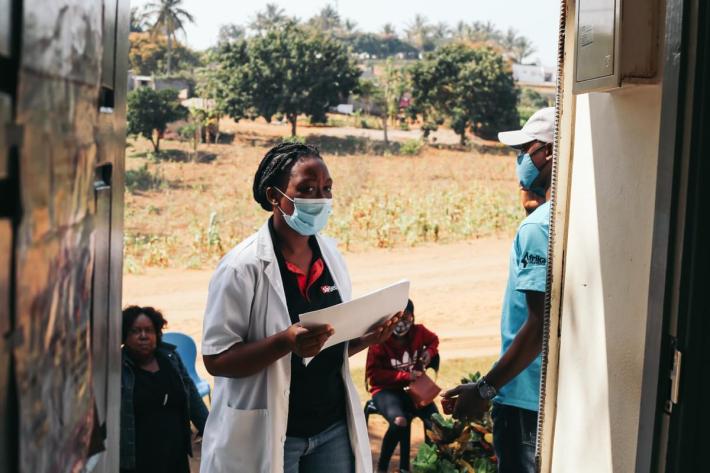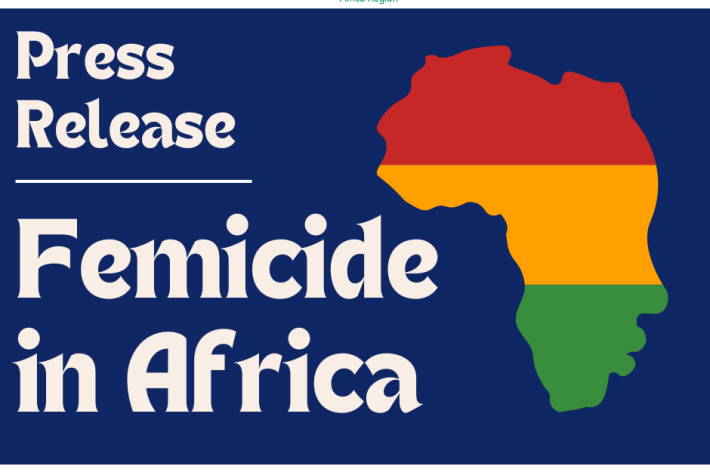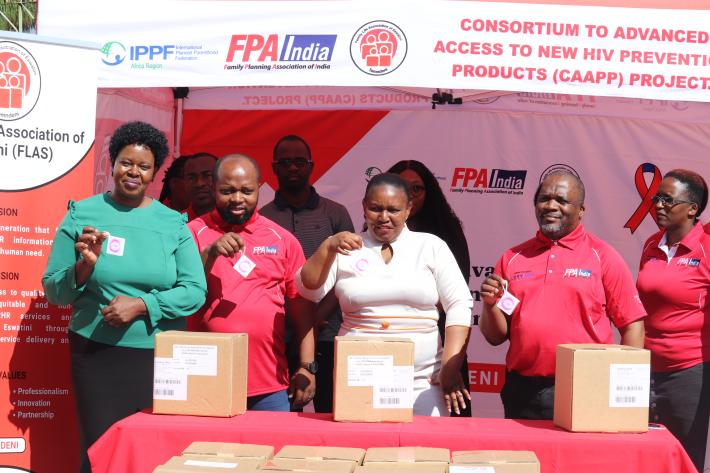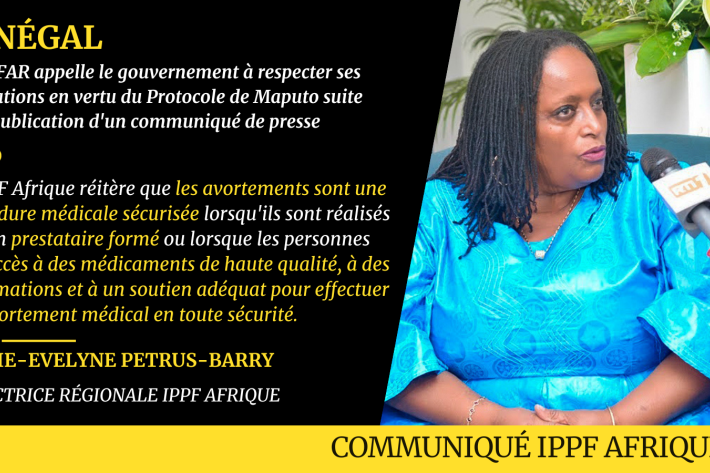Latest press releases
A selection of stories from across the Federation
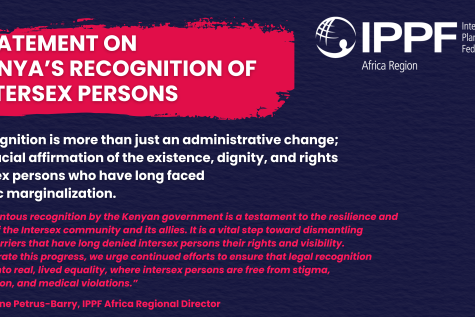
Kenya
IPPF Africa Region Welcomes Kenya’s Landmark Recognition of Intersex Persons
IPPF Africa Region Welcomes Kenya’s Landmark Recognition of Intersex Persons Nairobi, Kenya: 13 February 2025 – On 31 January 2025, Kenya has taken a groundbreaking step towards inclusivity and human rights by officially recognizing intersex as a sex marker alongside male and female in the Kenya Legal Notice 153 of 2025.


| 28 July 2022
Guinea: Horrific cases of rape and murder of girls must urge authorities to strengthen their efforts to prevent and combat sexual violence
Guinean authorities must take immediate measures to ensure thorough and impartial investigation of recent rapes and sexual assaults followed by murders committed over the course of just eight days and bring perpetrators to justice, Amnesty International and the International Planned Parenthood Federation (IPPF) said today. They must also increase their efforts to fight sexual violence by strengthening prevention, supporting access to justice for survivors and adopting a special law on violence against women. Six girls aged between three and 16, and a woman were sexually assaulted, and some were raped between 25 November and 2 December 2021. Two of the girls have died as a result of the violence. “Rape is all too commonplace in Guinea. Authorities should urgently strengthen their efforts to prevent and combat sexual violence in Guinea," said Samira Daoud, Amnesty International West and Central Africa director. Rape of girls On 2 December 2021, the Office for the Protection of Gender, Childhood and Morals (OPROGEM) presented a 24-year-old man charged with the rape of a three-year-old girl in the district of Gbessia in the capital Conakry. On 30 November another three-year-old girl was raped in Batè-Nafadji in the eastern region of Kankan. On 27 November, a 12-year-old girl was raped by two men on her way home in the town of Sanoun. This came just a day after the death of another 12-year-old girl in the north-eastern town of Siguiri. In the urban commune of Labé, west-central region of Guinea, a three-year-old girl was gang raped on 26 November. Local organization, "Agir pour le Droit Féminin", which met with the three-year-old girl's parents on 7 December, told the organizations that she was abducted when going to buy candy not far from the family home. She was then taken to an uninhabited house and sexually assaulted until she died. The girl’s father who met with the prosecutor confirmed his demand for justice for his daughter. One of the alleged perpetrator’s father requested forgiveness from the girl’s family but they refused. The rapes of girls followed the rape of a woman on 25 November while she was in a hospital in the north-western town of Kamsar for a surgery. The hospital management announced three days later they had "arrested the alleged perpetrator" -who is an external service provider- and taken him to the gendarmerie. The same day, a 16-year-old girl was also raped by several men in Kankan. “The authorities must ensure thorough and impartial investigations of these rape cases without delay and anyone found guilty must be brought to justice," said Marie-Evelyne Petrus-Barry, IPPF Africa Regional Director. “Survivors must receive access to medical care and psychosocial support as well as legal aid to access justice and redress.” More than 331 rape cases reported since the beginning of the year Since the beginning of the year, OPROGEM and the Special Brigade for the Protection of Vulnerable Persons (BSPPV in French) have already dealt with 331 rape cases. In 2020 alone, they dealt with 374 cases, a number which reflects only the tip of the iceberg according to NGOs working on sexual violence survivors, journalists, police and gendarmerie. This is due to the stigma associated with rape in Guinea, which often leads to not reporting the crime and not filing complaints, and often such cases are handled through mediation and out-of-court settlements between the victims or their families and the alleged perpetrators or their families. The recent rape cases follow another case that sparked a strong public reaction across the country last month. M’Mah Sylla, a 25-year-old woman, was allegedly raped by doctors at a non-licensed clinic in Conakry, where she went for treatment. She got pregnant as a result, and the same perpetrators raped her again when she returned to the clinic to seek an abortion. The rape caused injuries that could not be healed despite seven surgeries. The victim died on 20 November in Tunis (Tunisia) where she was medically evacuated following a government intervention. Following M’Mah Sylla’s death, women staged protests on 22, 24 and 30 November in the towns of Labé, Kindia and N’Zérékoré, demanding justice for all victims of rape. On 21 November, the Ministry of Justice said three of the four alleged perpetrators of M’Mah Sylla’s rape had been detained in Conakry prison. The government also presented its condolences to her family on behalf of the head of state. Activists spoke out on the surge in rape cases. Djenab Boiro of “Mon Enfant, Ma vie” a local organization, told Amnesty International during a meeting in Conakry: “Even dead, M'Mah Sylla deserves justice. I am convinced that the day the perpetrators will be sentenced to the punishment they deserve, her soul will finally rest in peace. We have had too many cases like M'Mah Sylla’s and we hope and dream of not having any more.” “Authorities have taken some steps in the right direction in recent years which we welcome, such as the creation in 2020 of a special unit within the gendarmerie to fight sexual violence. In addition, local women’s rights organizations have played and continue to play a major role in speaking up against sexual violence, together with some media,” said Samira Daoud "Despite this situation, the persistence of rape cases, especially of girls, calls for much greater efforts to raise awareness among the public to prevent sexual violence, to protect the survivors, and ensure their timely access to justice and reparations as well as to bring perpetrators to account. This includes but is not limited to the adoption of a special law on violence against women, as recommended by the CEDAW Committee,” concluded Marie-Evelyne Petrus-Barry. Read this article in French here. To arrange an interview, please contact: Amnesty’s Press Office Email [email protected]; West and Centra Africa’s Twitter: @AmnestyWaro; and/or IPPF Africa Region Lead Communication Advisor, Mr. Mahmoud Garga ([email protected])

| 28 July 2022
Abortion hearings: What’s going on in Namibia?
Namibia is under the spotlight this month as it resumes public hearings on abortion on 16 January. This follows the hearings which took place late last year, and will hopefully play an important role in the liberalization of abortion laws in the country. The current laws regulating abortion are no longer fit for purpose – not least because the Abortion and Sterilisation Act of 1975 was adopted under apartheid South African rule and has since been repealed in South Africa. The Act currently permits abortion only in very limited circumstances, and imposes criminal penalties on women who obtain and those who perform abortions outside of this limited scope. Those who can afford it are forced to travel to South Africa for abortion care, but this option is out of reach for many women. The law, therefore, impacts far more heavily on poor and black women, perpetuating the cycle of poverty and reinforcing injustices. In 2020, 62,000 Namibians signed a petition calling for the liberalization of abortion laws, so there is certainly public backing for progress. The upcoming hearings are a key opportunity to make positive changes in the lives of all women, regardless of religious beliefs, age, race, and socioeconomic status.

| 28 July 2022
Namibia: High Court rules against same-sex couples fighting for recognition of their marriages
The IPPF Africa region is concerned by the Namibian High Court ruling on the application of non-Namibian same-sex spouses to live and work in the country. It is the latest legal battle to push for equal rights in the country. According to the High Court’s judge, Hannelie Prinsloo, the legal decision was based on an outdated law preventing the LGBTI+ community from enjoying equal human rights across the country. IPPFAR strongly encourages African Governments to review and adapt outdated laws to reflect today’s societal realities ensuring the full enjoyment of human rights for all.

| 28 July 2022
World Population Day 2021: Increasing Effective Strategies for SRHR Information and Services (Focus on Malawi)
Sunday, 11 July 2021. As we commemorate the World Population Day with a projected 7.9 billion people on the planet today, our thoughts also turn to what were the reproductive needs and wants of women and girls in Africa during this extraordinary year and whether were they fulfilled. The COVID-19 pandemic has had devastating effects on the provision of health care services, including sexual and reproductive health (SRH) services, often more so in countries in Africa that are already struggling to keep up with normal preventative and curative services, let alone COVID-19 related morbidity and mortality. While fertility rates across the globe are shifting in both directions, and with Africa accounting for the top 23 highest total fertility rates (TFR)[1] in the world, the IPPF Women’s Integrated Sexual Health project (WISH2) provides SRH care to women, men and young people in 15 countries across the world - 12 of them being in Africa, including in fragile and conflict affected countries. The WISH2 program offers quality integrated and inclusive family planning and SRH services to marginalized and hard to reach populations: the poor, youth under 20 years and people living with disability. Within this framework, the WISH2 project recognized that many of these countries’ health services have been devastatingly affected by waves of the pandemic and adapted SRH services to ensure, wherever possible, continued access to SRH care to support women to achieve their reproductive intentions during the pandemic. In Malawi, we can focus in on young people against the backdrop of COVID-19 and a health system struggling to cope. Youth in Malawi face a myriad of challenges such as early marriages, unintended pregnancies, unsafe abortions, high new HIV infections, early childbearing, drug and alcohol abuse, high illiteracy rate, poverty, and HIV and AIDS pandemic. (NSRHR Policy 2017–2022). While young people make up the largest and fastest growing proportion of population in Malawi with 51% of the population below 18 years, access to SRH care remains low among Malawian youth with 41% of adolescent women aged 15–19 having an unmet need for modern contraception. A Family Planning training in Lilongwe, Malawi, by Family Planning Association of Malawi (FPAM). As the world celebrates population day, the Family Planning Association of Malawi (FPAM), which is IPPF's Member Association in the country, has increased effective strategies for providing access to information and SRH care to youth, including persons living with disabilities throughout the pandemic in the country. Some of these strategies include; Training of youth leaders to conduct peer learning programs and training of health care providers in Youth friendly services. Establishing youth friendly spaces at service delivery points. Conducting awareness creation and demand for SRH services to youth including conducting dialogue sessions, and engaging on WhatsApp and other social media platforms like Facebook. Sensitizing parents and guardians to create an enabling environment for youth to access SRH services. Coordinating with the Malawi Council for people with disabilities (MACOHA) - a government agency - to increase access to SRHR for persons with disabilities. Community Reproductive Health Promoters sensitization on engaging with young people with disabilities in the community. Use of the growing mobile phone market in Malawi as a new avenue for reaching young clients by working with a local mobile service operator to promote SRHR messaging on the 3-2-1 platform (a free to use mobile subscription app). These strategies can be found in full here. “Our work complements Government efforts. Through the WISH project and other projects, FPAM has been able to reach out to young women particularly in the hard-to-reach areas with SRH information and services which otherwise could not be available if FPAM was not present in those areas”, said Donald Makwakwa, Executive Director at the Family Planning Association of Malawi. A community training activity by FPAM. In this coming year, despite reduced funding, the project will aim to continue maintaining its innovative adaptations to support access to quality SRH services and rights for women and men living in the most difficult of circumstances. Joyce Ayong, IPPF Board of Trustee member and President of the Youth Action Movement (YAM) at the Cameroon National Planning Association for Family Welfare (CAMNAFAW) highlighted the importance of youth outreach and inclusion especially in the most difficult of circumstances. “We campaign for the cause of young people so that they are taken into account. Young persons with disabilities and youth living in hard to reach areas also need to access SRH care and information and it is our duty to continue to find ways to provide these lifesaving services to them”, said Ayong. The WISH2 program will continue to find adaptive strategies ensuring that the much-needed SRH care in some of the hardest hit countries by the pandemic is delivered to the most marginalized, leaving no one behind when it comes to family planning needs. About the Women’s Integrated Sexual Health Project 2 The Women’s Integrated Sexual Health (WISH) programme offers quality integrated and inclusive family planning and sexual and reproductive health services to marginalized and hard to reach populations: the poor, youth under 20 years and people living with disability. WISH is the UK Government’s flagship programme to support integrated sexual and reproductive health and rights (SRHR) services in a range of countries across Africa and Asia by 2021. The International Planned Parenthood Federation (IPPF) manages the WISH programme through a consortium arrangement (Lot 2) with 10 IPPF Member Associations and hand - picked partners chosen for their expertise to maximise access and reach for people in 15 countries: Development Media International (DMI), Humanity and Inclusion UK (HI), International Rescue Committee (IRC), Marie Stopes International (MSI), and Options Consultancy Services (Options). The countries are: Afghanistan, Bangladesh, Burundi, Ethiopia, Madagascar, Malawi, Mozambique, Pakistan, Somalia, South Sudan, Sudan, Tanzania, Uganda, Zambia, Zimbabwe. For more updates on our work, follow IPPF Africa Region on Facebook, Twitter, Instagram and You Tube. [1] Total Fertility Rate 2021 (worldpopulationreview.com)

| 28 July 2022
IPPF Africa Region Congratulates Gabon on Depenalisation of Same-Sex Sexual Relations
The International Planned Parenthood Federation Africa Region (IPPFAR) congratulates the Gabonese Republic on its recent removal of article 402 (5) in the penal code, which criminalized homosexuality. On 29 June 2020, Gabon’s Senate voted to repeal the country's sodomy law. The vote stood at 59 in favour of repeal, and 17 against. This followed the National Assembly’s vote of 23 June 2020 which saw 48 MPs vote in favour, 24 against, and 25 abstentions. It is now up to the Head of State to promulgate the text. IPPFAR celebrates this significant win with the Gabonese lesbian, gay, bisexual, transgender and intersex (LGBTI) community and activists, including human rights organisations -all of whom have worked tirelessly towards this achievement. IPPFAR is one of the leading organisations at the forefront of advocating for the respect of sexual and reproductive health and rights for all. We strongly believe that no law should criminalize a person’s sexuality, and that no one should be discriminated against because of their sexual orientation. IPPFAR hopes that this recent development in Gabon will inspire other African countries to take a similar approach -that of protecting and upholding the rights of every individual. IPPFAR reiterates its commitment to supporting and working with governments, organizations and individuals in the advancement of sexual reproductive health and rights for all. For more information about the work of IPPF Africa Region, follow us on Facebook and Twitter.

| 28 July 2022
IPPFAR Statement on World Cancer Day 2021
Every year on 4 February, IPPF Africa Region joins the world in marking the World Cancer Day. This is a day set aside to draw attention to the cancer disease and encourage action towards a future free of cancer. This year’s theme is ‘I Am and I Will’, which encourages personal initiative to take the necessary action to combat cancer. Cancer is one of the leading causes of morbidity and mortality worldwide, with approximately 70% of deaths from the disease occurring in low-and middle-income countries, according to the World Health Organization. As a fast-rising major public health concern in many developing countries, cancer leaves behind devastating effects on families, communities and economies. Yet, if detected and treated early, many cancer deaths can be averted. Early diagnosis however remains a great challenge in sub-Saharan Africa. In addition to lack of awareness about cancer risk factors, many health systems across the continent are not fully capable of meeting the demands of early diagnosis, testing, treatment and management. At IPPF Africa Region, we complement government efforts in addressing the health challenges in sub-Saharan Africa. Through our Member Associations (MAs) in 39 countries, we work with different partners: both in the public and private sectors in providing sexual and reproductive health services. One of our focus areas is reproductive health cancers, including breast cancer, cervical cancer, ovarian cancer and prostate cancer. Through our static clinics, mobile clinics and other outreach strategies, our MAs continually create awareness about cancer, by providing information on prevention, risk factors and where they can access related services. Our MAs also offer cancer-related services including visual inspection with acetic acid (VIA) for cervical cancer screening, HPV testing, mammogram screening for breast cancer, and referrals for surgery, radiotherapy, chemotherapy and further management. Between 2017 – 2019, IPPF Africa Region saw an estimated 4,278,029 women tested for cervical cancer. A further estimated 2,398,576 people were tested for breast cancer. Through our clinics, an estimated 97,496 people underwent surgical treatment in the same period. Our contribution to such cancer data is important for the development of cancer control programmes and creation of cancer policies. We are also involved in cancer surveillance and research activities that inform the development of reproductive cancer drugs and vaccines. Our advocacy efforts include calling on African leaders to prioritize the health agenda in their countries and follow up on their commitment to various health instruments such as the Abuja Declaration. The Abuja declaration requires African countries to commit at least 15% of their annual budgets to improving the health sector. The health of any country begins with an individual so on this day, we urge all of us to make a personal commitment to take various actions that will reduce the cancer burden in our countries. It is our responsibility to ensure that we go for regular screening and testing, avoid risk factors that predispose one to cancer, advocate for cancer prevention, treatment and management, including speaking out in support of research, as well as advocate for the implementation of international commitments to health care in our countries. What we do today matters towards the realization of a cancer-free future.











